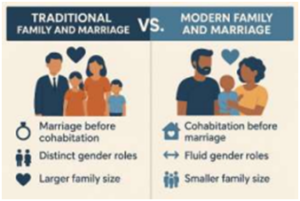Ethics Theory, TLP-UPSC Mains Answer Writing
Q. 2. “The institution of family and marriage in India is witnessing a paradigm shift.” Examine the changing trends in family structures and marriage practices in contemporary India. (150 words, 10 marks)
Introduction
Family is a group of people related by blood or adoption living together, while marriage is a socially approved union between partners. In India, both are evolving rapidly due to modern forces, leading to a shift in traditional patterns.
Body
Changing Trends in Family Structures
- Rise of Nuclear Families: More couples move to cities for jobs and raise children independently, preferring nuclear setups over joint families.
- Single-parent Households: Due to divorce or personal choice, more families are now headed by one parent, especially in urban areas.
- Changing Role of Women: Women are more independent today, delaying marriage, pursuing careers, and actively participating in family decisions.
- Live-in Relationships: Some couples live together without marriage, which is gaining legal acceptance and becoming more common in cities.
Changing Trends in Marriage Practices
- Delayed and Convenient Marriages: Youth are marrying later due to career focus, and some enter short-term marriages for immigration or financial benefits, especially in states like Punjab.
- Love, Inter-caste and Interfaith Marriages: Personal choice is becoming more important in urban areas, and slowly breaking traditional marriage boundaries.
- Rise in Divorces: More couples now separate when unhappy, showing a growing acceptance of divorce as a valid choice.
- Same-sex Relationships: LGBTQ+ relationships are gaining visibility and legal recognition, though same-sex marriage is not yet legal.

Some Traditional Values Still Remain
While new patterns are emerging, many traditional ideas around family and marriage still continue in India.
- Preference for Arranged Marriages: NFHS data shows around 85% of Indian marriages are still arranged by families.
- Patriarchal Norms: In many rural areas, women still need permission for basic choices like work or mobility.
- Family Honour and Social Approval: Honour killings and opposition to inter-caste marriages are still reported in states like Haryana.
- Importance of Marriage: Social stigma around being unmarried still exists, especially for women, in both urban and rural areas.
Conclusion
Family and marriage in India are clearly changing with time, yet some traditional ideas remain strong. According to NFHS-5 and Pew Research surveys, while modern patterns are rising, Indian society still strongly values family ties and marriage customs.











